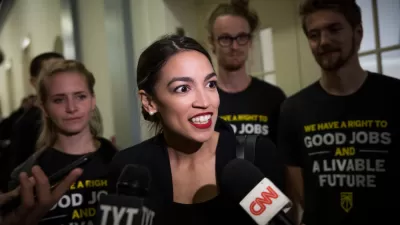President Xi Jinping announced a landmark commitment on Sept. 25 to commence a cap-and-trade program in 2017, going further than the U.S. to limit emissions.
"The announcement, to come during a White House summit meeting with President Obama, is part of an ambitious effort by China and the United States to use their leverage internationally to tackle climate change and to pressure other nations to do the same," write
Republican opponents of President Barack Obama's climate change initiatives have cited China's inaction on global warming, particularly since China is now the world leader in total carbon emissions, though the United States is larger in per capita emissions as the Union of Concerned Scientists chart shows.
Sen. Mitch McConnell (R-Ky.), majority leader of the Senate, had been quick to condemn President Obama's November climate agreement with President Xi Jinping: "...as I read the agreement (it) requires the Chinese to do nothing at all for 16 years, while these carbon emissions regulations are creating havoc in my state and other states around the country," he said.
President Xi Jinping's landmark announcement builds on that historic agreement.
While the cap-and-trade program may start in two years, "it is not clear whether China will be able to enact and enforce a program that substantially limits emissions," note Davis and Davenport. "But the agreement, which American officials said had been in the works since April, is China’s first commitment to a specific plan to carry out what have so far been general ambitions."
Under a cap-and-trade system, a concept created by American economists, governments place a cap on the amount of carbon pollution that may be emitted annually. Companies can then buy and sell permits to pollute. Western economists have long backed the idea as a market-driven way to push industry to cleaner forms of energy, by making polluting energy more expensive.
The United States came close to adopting such a system when the House passed the American Clean Energy and Security Act (Waxman-Markey bill) in June, 2009, which died "when Senate Majority Leader Harry Reid decided not to include a carbon cap or renewable energy standard on the stripped-down bill," according to Time.
Robinson Meyer, associate editor at The Atlantic, explains why China's "new national carbon-market program is such a huge deal."
FULL STORY: China to Announce Cap-and-Trade Program to Limit Emissions

Planetizen Federal Action Tracker
A weekly monitor of how Trump’s orders and actions are impacting planners and planning in America.

Map: Where Senate Republicans Want to Sell Your Public Lands
For public land advocates, the Senate Republicans’ proposal to sell millions of acres of public land in the West is “the biggest fight of their careers.”

Restaurant Patios Were a Pandemic Win — Why Were They so Hard to Keep?
Social distancing requirements and changes in travel patterns prompted cities to pilot new uses for street and sidewalk space. Then it got complicated.

California Homeless Arrests, Citations Spike After Ruling
An investigation reveals that anti-homeless actions increased up to 500% after Grants Pass v. Johnson — even in cities claiming no policy change.

Albuquerque Route 66 Motels Become Affordable Housing
A $4 million city fund is incentivizing developers to breathe new life into derelict midcentury motels.

DC Area County Eliminates Bus Fares
Montgomery County joins a growing trend of making transit free.
Urban Design for Planners 1: Software Tools
This six-course series explores essential urban design concepts using open source software and equips planners with the tools they need to participate fully in the urban design process.
Planning for Universal Design
Learn the tools for implementing Universal Design in planning regulations.
Heyer Gruel & Associates PA
JM Goldson LLC
Custer County Colorado
City of Camden Redevelopment Agency
City of Astoria
Transportation Research & Education Center (TREC) at Portland State University
Camden Redevelopment Agency
City of Claremont
Municipality of Princeton (NJ)




























